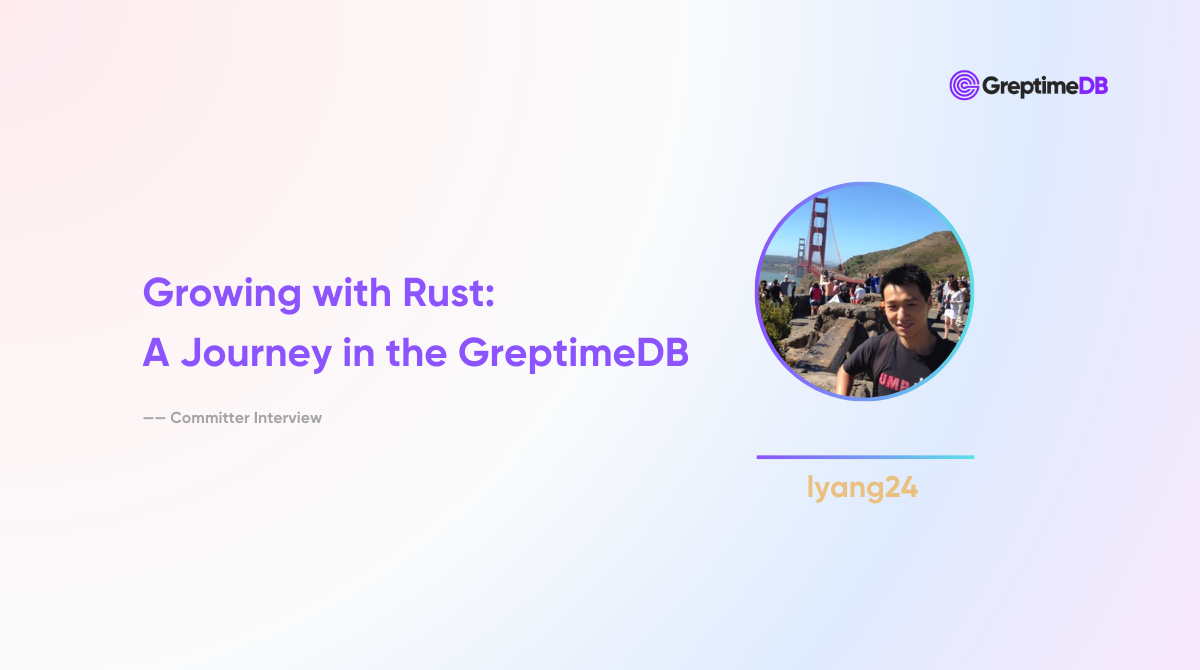p.s. Interviewed by Greptime engineers Lei and Ruihang, together with community ops Beryl. This story is told from an internal GreptimeDB perspective. Interviewee GitHub ID: lyang24, referred to as Lanqing in the text.
At first, it was just casual interest. Then, he became a familiar face in the community. And eventually, he was invited to be a committer.
Lanqing is one of our newest committers. We first met him on Slack, and later through his contributions on GitHub. Unlike most committers before him, he truly started out as a 'user'. He’s an engineer based North America, previously working on infrastructure at Facebook, ByteDance, and Roblox. Today, he’s developing storage systems at a tech company — a journey that naturally led him into the GreptimeDB open source community.

🧭 From Reading a Blog Post to Submitting a PR
“I first came across a blog post you wrote — it was about optimizing VictoriaMetrics. Our company happened to be using VM at the time, and I thought the post was well-written, so I started following GreptimeDB.”
That blog post, an early performance comparison piece from our community, later evolved into our updated benchmark reports. Back then, Lanqing wasn’t contributing yet, just watching from the sidelines. But it didn’t take long before he started getting involved.
His first PRs were small — configuration fixes and documentation tweaks.
“Just some config file updates and basic docs.”
But the feedback was fast, encouraging, and welcoming. That support convinced him to stick around. He kept contributing, moving from peripheral improvements into deeper parts of the codebase.
💻 Treating GreptimeDB as a Rust Playground
Lanqing had used Rust before. In his previous job, he built a database access layer entirely in Rust. Earlier still, he witnessed major companies embrace Rust — Facebook, ByteDance, and TikTok all adopted Rust for new infrastructure projects. At Roblox, he saw Rust introduced into production.
“I think Rust is great, especially for infra. It’s not the easiest language to write, but its safety guarantees are just perfect for low-level systems.”
Although his current role no longer uses Rust, he didn’t want to lose touch with it. Open source became the perfect outlet.
“I still love Rust, but don’t get to use it at work. Open source helps me stay sharp.”
For Lanqing, contributing to GreptimeDB was more than just keeping his skills fresh — it helped him reframe how he thinks about technical design and system-level implementation.
🔧 From Peripheral Fixes to Core Storage
Lanqing’s first technical breakthrough came from a small PR involving a string trait implementation. It was a seemingly minor patch but required a deep understanding of how data structures were being serialized, converted, and returned inside the engine.
“That kind of thing isn’t really documented. You figure it out through feedback and reviews.”
Each PR review gave him something new to learn. He didn’t consider himself someone who could jump straight into core internals, but slowly, he deepened his understanding of KV storage, protocol support, and system behavior.
“The reviews were super responsive — not just rubber-stamp approvals, but actual detailed feedback.”
Overall, he describes GreptimeDB as one of the smoothest onboarding experiences in open source he’s ever had.
🗣️ Slack Is Quiet, and I Worried Asking Too Many Questions
Regarding the enduring focus on fostering a vibrant community atmosphere, we’ve taken deliberate steps to amplify diverse voices and inclusivity – a strategic initiative initially sparked by feedback from one of our Committers. When asked about community atmosphere, Lanqing gave candid feedback.
“Slack feels a little quiet. I didn’t want to ask too many questions and bother people.”
Turns out, many others felt the same way — which only made Slack quieter. But he realized that asking questions is itself a valuable form of feedback.
Part of the issue may stem from the fact that many open source projects are backed by companies, often creating a gap between internal members and external individual contributors.
“Rather than building a super active chat room, I think it’s more important to have great docs and technical blogs — so people can find answers and start using the project.”
🏅 What Becoming a Committer Means
When our team internally voted to nominate Lanqing as a committer, he had just finished work in Seattle.

“It felt like recognition for the effort I’ve put in. But I don’t feel pressure to ‘do more’ — if anything, I’m more curious about the deeper layers now, like your new Mito2 storage engine.”
He’s now more interested in the internals of database engines and plans to spend more time reading storage-related code to fill in the gaps in his understanding.
🚗 A Quick Side Note: Databases on EVs
Living in Seattle, Lanqing says electric cars are everywhere. When we mentioned our edge computing and in-vehicle database solution, he said:
“That kind of setup is still pretty novel in North America. You should definitely share more about how it’s working on the car side.”
He sees a lot of potential in this direction, especially for saving on data backhaul costs and unifying data collection protocols.
“You might be the first team in the world to get a time-series database running in a car.”
However, he also noted that success in this field isn’t just about tech — it also requires understanding supply chains and navigating complex collaboration ecosystems.
🧩 The Final Thoughts
Our favorite quote from the entire conversation came when he casually said:
“I’m not here for the title — I just don’t want to forget Rust.”
No grand narratives. No “changing the world with technology.” Just a genuine love for the language, a commitment to staying involved, and the curiosity that comes from making one small PR.
At the end of the day, it’s about finding a space where you can keep writing code, stay sharp, and have people who respond.
We’re grateful for and proud to welcome people like Lanqing into our community.
📌 Want to Get Involved?
- Say hi to Lanqing: @lyang24
- Check out GreptimeDB on GitHub: https://github.com/GreptimeTeam/greptimedb
- Join our Slack: https://greptime.com/slack
- Explore our documentation: https://docs.greptime.com/
Interviewers: Lei, Ruihang, Beryl
Interviewee: @lyang24
About Greptime
Greptime offers industry-leading time series database products and solutions to empower IoT and Observability scenarios, enabling enterprises to uncover valuable insights from their data with less time, complexity, and cost.
GreptimeDB is an open-source, high-performance time-series database offering unified storage and analysis for metrics, logs, and events. Try it out instantly with GreptimeCloud, a fully-managed DBaaS solution—no deployment needed!
The Edge-Cloud Integrated Solution combines multimodal edge databases with cloud-based GreptimeDB to optimize IoT edge scenarios, cutting costs while boosting data performance.
Star us on GitHub or join GreptimeDB Community on Slack to get connected.







